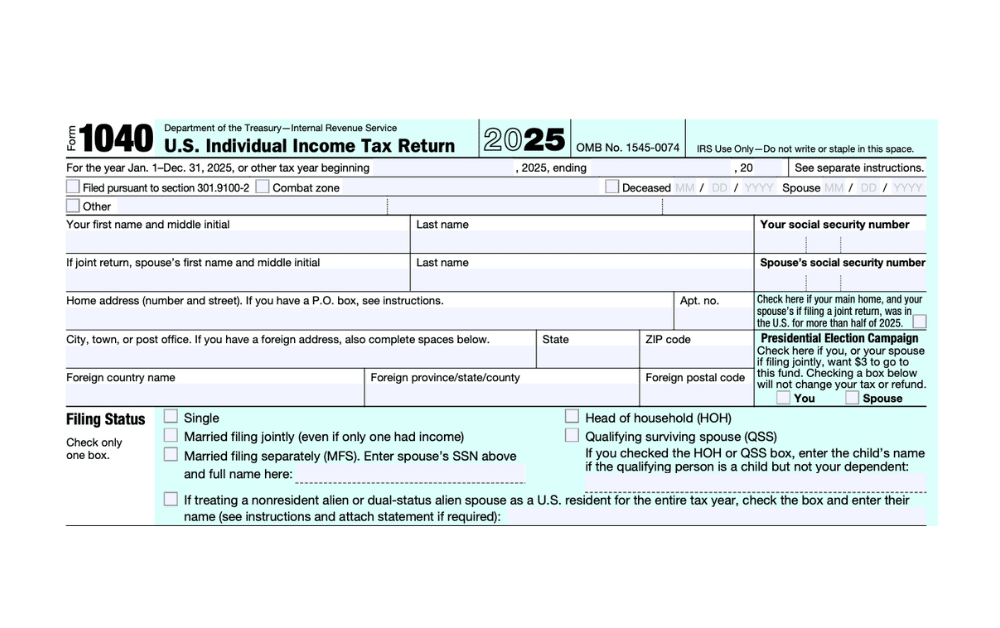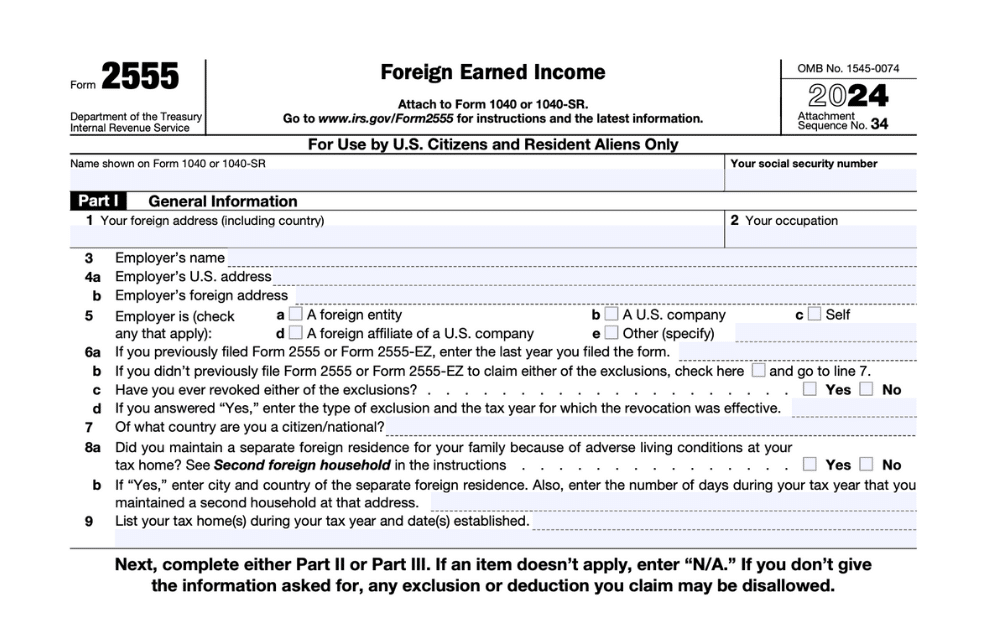US Tax Forms for Expats: What You Need to File

- Key Tax Forms Expats Need
- Form 1040: The Standard US Tax Return
- Form 2555: Foreign Earned Income Exclusion (FEIE)
- Form 1116: Foreign Tax Credit (FTC)
- Form 8938: Statement of Specified Foreign Assets (FATCA)
- FinCEN Form 114 (FBAR) – Foreign Bank Account Report
- Form 8833: Treaty-Based Return Position Disclosure
- Form 5471: Reporting Foreign Corporations
- Form 8865: Reporting Foreign Partnerships
- Form 8865: Reporting Foreign Single Member Limited Liability Company
- Form 8621: Passive Foreign Investment Companies (PFICs)
- Common Expat Tax Mistakes & How to Avoid Them
- Have Additional Questions About US Tax Forms for Expats?
Living abroad doesn’t exempt you from filing US taxes. As an American expatriate, you must report your worldwide income, foreign accounts, and overseas investments to the IRS — often using multiple tax forms.
Failing to file the right forms can lead to IRS penalties. Using them correctly, on the other hand, can reduce or even eliminate your US tax liability through deductions and credits. That’s good news for anyone!
Key Tax Forms Expats Need
As a US expat, your tax filing obligations can be more complex than those of domestic taxpayers. In addition to the standard tax return (Form 1040), you may need to file additional forms to report foreign income, accounts, assets, and business interests.
Here’s a breakdown of the most important tax forms for Americans living abroad:
| Form | Purpose | Who Should File? | Key Considerations |
| Form 1040 | Standard US individual tax return | All US citizens & Green Card holders | Expats get an automatic extension to June 15 but must still pay any taxes owed by April 15 |
| Form 2555 | Claim the Foreign Earned Income Exclusion (FEIE) | Expats earning salary, wage, or self-employment income abroad | Excludes up to $130,000 (2025 tax year) of foreign-earned income from US taxation |
| Form 1116 | Claim the Foreign Tax Credit (FTC) | Expats paying foreign income tax | Reduces US tax dollar-for-dollar for foreign taxes paid |
| Form 8938 | Report foreign financial assets | Expats with foreign assets over $200K (single) / $400K (joint) | Includes bank & investment accounts, does not replace FBAR |
| Form 8833 | Declare tax treaty benefits | Expats using a tax treaty to reduce or eliminate US tax | Required for any treaty-based tax position you claim |
| Form 5471 | Report foreign corporations | Expats with 10%+ ownership in a foreign corporation | A complex form requiring detailed financial reporting |
| Form 8865 | Report foreign partnerships | Expats with 50%+ control or 10% ownership in a partnership | Similar to Form 5471, but for partnerships instead of corporations |
| Form 8858 | Report foreign Single Member Limited Liability companies | Expats that own a Single Member LLC | Similar to Form 5471, but for Single Member foreign LLCs instead of corporations |
| Form 8621 | Report Passive Foreign Investment Companies (PFICs) | Expats with foreign mutual funds, ETFs, or certain pensions, none of which are registered in the US. | PFIC taxation can be harsh — failure to file triggers IRS penalties |
| FinCEN Form 114 (FBAR) | Report foreign bank accounts | Expats with $10K+ in foreign accounts at any time | Separate from Form 8938 — must be filed electronically |
Make Sure You Are Filing the Right Forms
Now, let’s look at some of these forms in more detail.
Form 1040: The Standard US Tax Return
All US citizens and Green Card holders, regardless of where they live, must file Form 1040 annually to report their worldwide income to the IRS. Expats are not exempt from this requirement.
Deadlines for Expats
- April 15, 2026 – Standard tax filing deadline
- June 15, 2026 – Automatic extension for expats (payment still due April 15)
- October 15, 2026 – Additional extension available upon request (must file Form 4868)
Form 2555: Foreign Earned Income Exclusion (FEIE)
The FEIE allows qualifying expats to exclude up to $130,000 of foreign-earned income from US taxation in 2026.
Who Qualifies?
To claim the FEIE, you must:
- Earn wages, salaries, or self-employment income from a foreign source.
- Pass one of two residency tests:
- Physical Presence Test: Be physically outside the US for 330 full days in a 12-month period.
- Bona Fide Residence Test: Be a permanent resident of a foreign country for at least one full calendar year.
Key Benefits
- Reduces taxable income, including foreign-earned wages, salaries, or self-employment income
- Helps expats avoid double taxation
- May allow for an additional deduction for foreign housing expenses through the Foreign Housing Deduction or Exclusion
Form 1116: Foreign Tax Credit (FTC)
The FTC provides a dollar-for-dollar credit for foreign income taxes paid, reducing your US tax liability.
Who Should Use This?
- Expats who pay foreign income tax and want to reduce their US tax bill
- Those who don’t qualify for the FEIE or have income exceeding the FEIE limit
- Expats living in high-tax countries like Canada, France, and Germany
How It Works
If you pay foreign taxes, you can claim a credit against your US taxes owed. The FTC limit is calculated based on the ratio of foreign income to total income. The purpose of this calculation is to allow you to apply the foreign tax paid against only the part of the US taxes owed from foreign income. You can’t apply the foreign taxes paid against US taxes owed from income earned from US sources:
(Foreign income ÷ Total income) × US tax liability = Maximum FTC allowed
Can You Use FEIE & FTC Together?
Yes, but not on the same income — you must allocate income between the two. The FTC is better for expats in high-tax countries where foreign taxes exceed US taxes.
Form 8938: Statement of Specified Foreign Assets (FATCA)
Under the Foreign Account Tax Compliance Act (FATCA), expats with significant foreign financial assets must report them on Form 8938. This form ensures compliance with US tax laws by preventing taxpayers from hiding income or assets abroad.
Who Must File?
- Single filers with foreign assets exceeding $200,000 at the end of the year or $300,000 at any point during the year
- Married joint filers with foreign assets exceeding $400,000 at the end of the year or $600,000 at any point during the year
- If you live in the US, these thresholds are significantly less.
What Needs to Be Reported?
- Foreign bank accounts
- Brokerage accounts held with foreign financial institutions
- Foreign stocks, mutual funds, and other investment accounts
- Foreign pension funds
- Life insurance policies with a cash value
What Does Not Need to be Reported?
- Real Estate
- Precious metals such as gold
- Cash/Currency
- Accounts that are similar to US Social Security
Does Form 8938 Replace FBAR?
No. While both forms report foreign financial assets, they have different filing requirements. Many expats must file both if they meet the reporting thresholds.
FinCEN Form 114 (FBAR) – Foreign Bank Account Report
The FBAR is required if you have foreign financial accounts with a total combined balance exceeding $10,000 at any time during the year. Even if the balance exceeds this threshold for just a single day, you must report all your foreign financial accounts.
Who Must File?
Expats with foreign financial accounts whose total balance exceeds $10,000 at any point during the tax year
What Must Be Reported?
- Foreign bank accounts
- Investment accounts held with foreign institutions
- Most foreign pension and retirement accounts
- Certain insurance policies that have a cash surrender value
FBAR Deadline
April 15, 2025, with an automatic extension to October 15 for expats
Form 8833: Treaty-Based Return Position Disclosure
Form 8833 allows expats to claim tax treaty benefits when applicable. The US has tax treaties with more than 60 countries to prevent double taxation and resolve residency conflicts.
Who Must File?
Expats using a tax treaty to:
- Avoid US taxation on foreign retirement benefits
- Reduce US taxes on foreign-earned income
- Claim nonresident status under a tax treaty tie-breaker rule
Find Out If You Missed Any Required Expat Tax Forms
Form 5471: Reporting Foreign Corporations
Form 5471 is required for US persons with ownership in foreign corporations. The IRS uses this form to track foreign businesses controlled by US taxpayers. Failure to file can result in significant IRS penalties, starting at $10,000 per missed filing.
Who Must File?
- Most expats who own at least 10% of a foreign corporation
- US citizens or residents who control a foreign company (50% or greater ownership)
Note that filing requirements are complex. Speak with a tax professional if you think you may be required to file this report.
Form 8865: Reporting Foreign Partnerships
If you own a stake in a foreign partnership, you may need to file Form 8865. This form is similar to Form 5471 but applies to partnerships rather than corporations.
Who Must File?
Expats with at least 50% control or 10% ownership in a foreign partnership
Form 8865: Reporting Foreign Single Member Limited Liability Company
If you own a foreign LLC, you need to file Form 8865. This form is similar to Form 5471 but applies to single-owner LLCs rather than corporations.
Who Must File?
Expats with 100% control or ownership in a foreign limited liability company.
Form 8621: Passive Foreign Investment Companies (PFICs)
Form 8621 is required for US taxpayers who hold investments in passive foreign investment companies (PFICs). The IRS classifies certain foreign mutual funds, exchange-traded funds (ETFs), and foreign pension funds as PFICs, subjecting them to strict taxation rules.
Who Must File?
- Expats who own direct or indirect shares in a foreign mutual fund, ETF, or other investment vehicle are classified as a PFIC
- Expats who receive income distributions from a PFIC
- Expats who sell shares in a PFIC
- Expats who make certain elections regarding PFIC taxation, such as:
- Mark-to-Market Election: Taxing gains annually to avoid penalties
- Qualified Electing Fund (QEF) Election: Paying tax on earnings as they accrue rather than deferring them
Common Expat Tax Mistakes & How to Avoid Them
Even experienced expats can make errors when filing their US tax returns. Here are some of the most common mistakes and how to avoid them:
- Failing to file a US tax return: Many expats mistakenly believe they are exempt from filing if they live abroad.
- Ignoring FBAR and FATCA reporting requirements: If you have foreign accounts or assets, check the thresholds to determine if you need to file.
- Incorrectly claiming the FEIE: Ensure you meet the Physical Presence Test or Bona Fide Residence Test before claiming this exclusion.
- Assuming foreign banks report to the IRS on your behalf: You are responsible for filing the necessary reports, including FBAR and Form 8938.
- Not reporting ownership in foreign companies: Foreign company ownership reports are required, even if you own a foreign company, only to hold legal title of property for asset protection purposes.
Have Additional Questions About US Tax Forms for Expats?
Greenback is happy to help with any other US tax forms for expats! We’d love to review your specific situation and guide you through which forms need to be completed.
If you’re ready to be matched with a Greenback accountant, click the get started button below. For general questions on expat taxes or working with Greenback, contact our Customer Champions.


